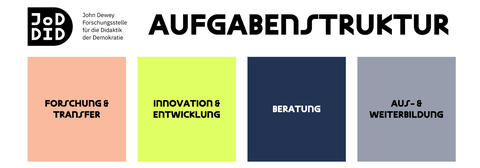Ziele & Aufgaben
Inhaltsverzeichnis
Die John-Dewey-Forschungsstelle für die Didaktik der Demokratie versteht sich als Innovationszentrum im Feld politischer Bildung und hat die Aufgabe, neue Formate, Methoden und Vermittlungskonzepte zu erforschen, fortzuentwickeln und sichtbar zu machen. Sie unterstützt damit sächsische Akteur:innen der außerschulischen Bildung bei der Vorbereitung, Neuentwicklung und reflexiven Bewertung von Angeboten zur politischen Bildung vor dem Hintergrund einer herausfordernden gesellschaftlichen Lage. Der Fokus der Forschungsstelle ist in diesem Zusammenhang insbesondere auf den Bereich der außerschulischen politischen Jugend- und Erwachsenenbildung gerichtet. Perspektiven schulischer politischer Bildung sind nur relevant, wenn sie mit außerschulischen Bildungsträgern in Beziehung stehen. Die John-Dewey-Forschungsstelle für die Didaktik der Demokratie schließt damit im Kontext des fachlichen Austauschs der (außerschulischen) politischen Jugend- und Erwachsenenbildung die Lücke zwischen akademischer Infrastruktur und pädagogischer Bildungspraxis.
Die John-Dewey-Forschungsstelle für die Didaktik der Demokratie lädt die Akteur:innen und Träger politischer Bildung ein, in einem anregenden Umfeld und mit forschendem Blick politische Bildung als Tätigkeitsfeld mit seinen spezifischen und zeitgenössischen Herausforderungen zu reflektieren.
FORSCHUNG UND TRANSFER
Die Forschung an der John-Dewey-Forschungsstelle für die Didaktik der Demokratie ist im Kern auf die Frage gerichtet, wie Menschen ihre politische Urteils- und Handlungsfähigkeit fortentwickeln können. Sie forscht damit zu allen Fragen der Didaktik der politischen Bildung, bezieht sich in diesem Zusammenhang aber im Kern auf die Begleitung, Auswertung und Unterstützung von Projekten, Vorhaben und Trägern im Bundesland Sachsen. Hierbei kann es durchaus sinnvoll sein, Erfahrungen aus Projekten anderer regionaler Räume mit heranzuziehen. Der Fokus der Forschungsarbeit bleibt aber auf die Wirkungsstätte der Forschungsstelle in Sachsen bezogen.
Die John-Dewey-Forschungsstelle für die Didaktik der Demokratie verfügt über die Möglichkeit, Projekte und Vorhaben Dritter in Bezug auf die Didaktik der politischen Bildung zu evaluieren. Sie interessiert sich insbesondere für die Frage, wie es der außerschulischen politischen Jugend- und Erwachsenenbildung gelingen kann, in und durch unterschiedliche Räume und deren Gestaltung neue Zielgruppen zu erschließen und diskriminierungssensibel und lebensweltorientiert mit möglichst unterschiedlichen Menschen gleichzeitig auf Augenhöhe zu arbeiten.
Forschungsstrategien, die für die John-Dewey-Forschungsstelle für die Didaktik der Demokratie maßgeblich sind, sind zum einen partizipative Forschungsstrategien, die die pädagogischen Akteur:innen sowie deren Zielgruppen in ihren jeweiligen Wirkungsräumen aktiv in den Forschungsprozess mit einbeziehen, sowie Elemente des sogenannten Design Based Research – ein aus den Ingenieurwissenschaften entliehenes Forschungsverfahren – welches durch die Entwicklung neuer Modelle, Strategien (Designs) und deren kontrollierter Implementierung im Feld neue Erkenntnisse über das Feld und die Wirksamkeit von Modellen generieren kann (vgl. dazu Besand 2015). Die Forschungsstelle forscht qualitativ und quantitativ, hat aber eine besondere Expertise im Bereich der qualitativ-ethnographischen Feldforschung, um Strategien und Prozesse vor Ort sachkundig erfassen zu können.
Die John-Dewey-Forschungsstelle für die Didaktik der Demokratie macht ihre Forschung aktiv und breit sichtbar. Sie teilt ihre Erkenntnisse und Ideen. Konkret bedeutet das: Auf einer (digitalen) Plattform fließen alle Arbeitsbereiche der Forschungsstelle zusammen. Hier werden sowohl Forschungsergebnisse präsentiert, als auch Aus- und Weiterbildungsangebote annonciert. Über diese Plattform sammelt und präsentiert die Forschungsstelle zentrale wissenschaftliche und pädagogisch-didaktische Erkenntnisse zum Handlungsfeld sowie Methoden und Materialien, die sie geprüft und bewertet hat. Besonders bewährte Formate und Praxiserfahrungen werden herausgestellt und in kurzen Texten, Podcasts und Interviews erklärt. Die Plattform kann mit analogen Publikationen und Materialien aus dem Innovationslabor ergänzt werden.
INNOVATION & ENTWICKLUNG
In der Innovationswerkstatt identifiziert die Forschungsstelle Lücken in verbreiteten Formaten, Materialien und Methoden politischer Bildung und produziert neue, niedrigschwellige und spezifisch raumbezogene Konzepte und Materialien, welche sowohl in digitaler als auch in analoger Form verfügbar gemacht werden. Diese Neuentwicklungen werden über den Shop und das Leihhaus der Forschungsstelle den Akteur:innen im Feld der außerschulischen politischen Jugend- und Erwachsenenbildung zur Verfügung, Verwendung und Fortentwicklung bereitgestellt. Die Innovationswerkstatt der Forschungsstelle ist überdies ein Ort für Dritte, der aufgesucht werden kann, um im Dialog neue Ideen, Formate, Materialien und digitale Konzepte zu entwickeln, zu diskutieren und auszutesten. Sie fungiert in diesem Sinne als Labor und Werkstatt und verfügt sowohl über die Infrastruktur als auch die Expertise, um Materialentwicklungsprozesse Dritter bedarfsorientiert, schnell und unmittelbar zu unterstützen. Die Innovationswerkstatt stellt deshalb als reale Werkstatt Material und Maschinen bereit, um Bildungsmaterial zu erstellen oder weiterzuentwickeln.
Die John-Dewey-Forschungsstelle für die Didaktik der Demokratie hat die Aufgabe, auch Menschen zu erreichen, deren Zugänge zu politischen Bildungsangeboten bisher erschwert waren. Ein besonderes Augenmerk ist dabei auf die Entwicklung von interventionsorientierten und raumbezogenen Formaten gerichtet, die politische Bildung im öffentlichen, halböffentlichen und/oder digitalen Räumen ermöglichen.
BERATUNG
Die John-Dewey-Forschungsstelle für die Didaktik der Demokratie berät Akteur:innen und Träger in der Entwicklung und Umsetzung zukünftiger und/oder laufender Vorhaben und Projekte, vor allem aber in frühen Phasen der Konzipierung und Planung von Projekten und Vorhaben. Diese Beratung kann vor Ort oder in der speziell dafür ausgestatteten Beratungswerkstatt stattfinden. Das Ziel der Beratung wird dabei im Regelfall in einem Erstgespräch gemeinsam mit den Beratungsnehmer:innen festgelegt – der Fokus der Beratung lässt sich nichtsdestotrotz durchgehend als ein didaktischer beschreiben. Die Beratungsdauer reicht von kurzen Beratungsimpulsen im Kontext von Antragsentwicklungsprozessen bis hin zu längerfristigen und vernetzten Begleitungen und Trainings. Ein besonderes Augenmerk der John-Dewey-Forschungsstelle für die Didaktik der Demokratie ist dabei darauf gerichtet, nicht nur Träger aus urbanen Zentren, sondern auch Institutionen, Projekte und Initiativen im ländlichen Raum sowie im Kontext der Klein- und Mittelstädte durch ihre Arbeit zu unterstützen.
AUS- & WEITERBILDUNG
Die John-Dewey-Forschungsstelle für die Didaktik der Demokratie bietet sowohl digital als auch analog in ihrer Beratungswerkstatt Aus- und Weiterbildungsveranstaltungen für Akteur:innen der außerschulischen politischen Jugend- und Erwachsenenbildung an. Aus den Erfahrungen im Kontext der Pandemie haben sich dabei besonders digitale Weiterbildungsformate bewährt. Von Beginn an arbeitet die Forschungsstelle deshalb an einem zertifizierten Weiterbildungskurs mit dem Titel „Die Abendschule“. Dieser Kurs kann durch die Teilnehmer:innen kostenfrei und asynchron genutzt werden und richtet sich an vielfältige Akteur:innen der politischen Jugend- und Erwachsenenbildung.
Im Kontext von Ausbildungsangeboten strebt die Forschungsstelle Kooperationen mit bestehenden Ausbildungsgängen an. Ein besonderes Augenmerk ist dabei auf Ausbildungsgänge für Akteur:innen der Jugend- und Erwachsenenbildung, der Sozialen Arbeit oder auch Professionelle im Bereich früher kindlicher Bildung gerichtet.

